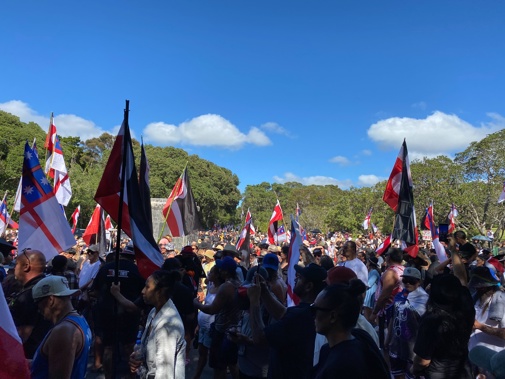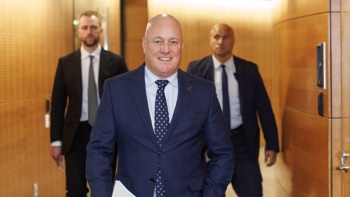
Waitangi Day was the spectacle we have come to expect. Like it was a reality TV show, politicians attended to supposedly pay their respects, while radicals acted out their disrespect. Most Kiwis didn’t bother about it and just enjoyed another summer day off work.
What could have been celebrated as a day of unity and pride, was not.
But was it much different from previous years?
In 2012, the late Sir Paul Holmes expressed in his Herald column the widespread disillusionment that most New Zealanders were feeling at the time – and are probably still feeling today - over the disrespect shown at Waitangi: “I’m over Waitangi Day. It is repugnant. It’s a ghastly affair. As I lie in bed on Waitangi morning, I know that later that evening, the news will show us irrational Māori ghastliness with spitting, smugness, self-righteousness and the usual neurotic Māori politics, in which some bizarre new wrong we’ve never thought about will be lying on the table.
“This we will have to address and somehow apply these never-defined principles of the Treaty of Waitangi because it is, apparently, the next big resentment. There’ll be lengthy discussion, we’ll end up paying the usual millions into the hands of the Māori aristocracy and God knows where it’ll go from there.”
Where it has gone is now clear. The coffers of the Māori aristocracy have swelled considerably since that time. According to a report produced by TDB Advisory assessing the wealth of the country’s largest tribal business conglomerates – those that hide behind charitable status and pay no tax - Ngai Tahu topped the iwi rich list last year with a value of $2.2 billion, Tainui came a close second also on $2.2b, followed by Auckland’s Ngati Whatua on $1.6b, Ngati Toa on $795 million, Tuhoe on $406m, Ngati Porou on $298m, Ruakawa on $238m, Ngati Awa on $180m, Ngati Pahauwera on $101m, and Ngapuhi, which hasn’t yet negotiated its Treaty settlement, on $88m.
It has also gone to individuals at the top of the tribal pyramid. In his analysis of the charity sector the Herald’s Matt Nippert described Māori Party president John Tamihere - the highest paid chief executive of a charity with an average executive salary of $510,679 - as a “somewhat surprising leader of this list”.
When Waitangi Day became a national holiday in 1973, it was renamed New Zealand Day by Labour Prime Minister Norman Kirk to reflect a broader concept of nationhood. His vision was for New Zealanders of every race and heritage to come together in mutual respect to celebrate their love of our country and pride in being Kiwis.
While Prime Minister Rob Muldoon changed the name back to Waitangi Day in 1976, successive Prime Ministers have used the occasion to reiterate the need for the nation to pull together and build a future we can be proud of - including Christopher Luxon who said: “We must aspire to go forward not as two sides, but together as New Zealanders because there is more that unites us than divides us.
“I believe New Zealand is the best country on earth. We have unlimited potential, and everything we need to be successful. There are simply no excuses for why we can’t do exceptionally well and be one of the world's leading, advanced small countries.
“This Waitangi Day, I renew this Government’s commitment to helping all New Zealanders, Māori and non- Māori, get ahead, and to giving all our children and grandchildren hope for a prosperous and secure future here in this great country. That goal, and many others, are entirely in our grasp. We can realise them together.”
To achieve the PM’s goal of building a better future, it would be helpful to bring clarity into the debate over the Treaty that’s been triggered by the proposed Treaty principles bill.
There are many drafts and interpretations of the Treaty, but as Gary Judd KC clarifies, the one that matters is the one that was signed by the vast majority of more than 500 chiefs - and that’s the Māori version of the Treaty.
But as journalist Mike Butler reveals, the “official” interpretation of the Māori version of the Treaty, that’s been used by successive Governments as the basis for Treaty policy, is highly politicised: “In 1986, with the 150th anniversary of the signing of the Treaty coming up, the Lange government invited Professor Sir Hugh Kawharu, an Oxford University trained Professor of Māori Studies at the University of Auckland, to check out the various translations that had been made of the Te Tiriti Māori text. He produced what is often called the Kawharu translation, which was accepted by the government of the day.
“But Sir Hugh was not necessarily the neutral academic that high-ranking politicians and jurists apparently took him for, and what he produced was a reinterpretation that serves as a manifesto.”
Butler explains that as well as being a member of the Waitangi Tribunal, Kawharu had been pro-active in supporting claimants in numerous Treaty disputes, and he points out that the Treaty partnership fabrication, which led to the disaster of co-governance under the Ardern Labour Government, can be traced back to the Kawharu rewrite.
In 1922, in response to ongoing questions about the meaning of the Treaty of Waitangi, Sir Apirana Ngata, a trained lawyer and Member of Parliament, wrote an explanation of the Māori version of the Treaty in the Māori language. His interpretation was held in such high regard, that in 1963 the Government translated it into English and distributed it to every Māori household.
That was the inspiration for the NZCPR’s Treaty book project, which has resulted in 1.1 million copies of Ngata’s explanation being delivered into New Zealand homes.
With Butler presenting such a clear argument as to why the Coalition Government must replace the Kawharu translation for official purposes, surely, it’s appropriate that the work of one of Maoridom’s greatest leaders - and the prominent New Zealand statesman who features on our $50 banknote - should be considered instead.
In a recent interview with the Herald, as part of its Waitangi Day coverage, Auckland University’s Professor Elizabeth Rata, a leading expert on the Treaty, reminded us that the Treaty of Waitangi was a crucial stepping stone on New Zealand’s journey to democracy.
It was only because Māori chiefs had ceded sovereignty to the Queen of England when they signed the Treaty that the British Parliament was able to pass the New Zealand Constitution Act in 1852 to establish our first Parliament and introduce democracy.
While sovereignty now rests with Parliament to govern on behalf of all New Zealanders, it is voters who have the democratic power to decide who should rule the country: government of the people, by the people, for the people. And every three years we exercise that power at the ballot box, when we decide whether the old Government should carry on - or be replaced.
As Rata reiterates, the Treaty, which played such a crucial role in our development as a nation, enabling the brutality to end and democracy to begin, has now fulfilled its purpose. That’s not to say it’s no longer relevant, especially as some tribal groups still have not concluded their Treaty settlements, but it is not part of our constitutional arrangements and that’s the way it must stay if we are to remain a democracy.
Unsurprisingly, iwi leaders and their supporters do not agree. They want the Treaty enshrined in law in a new constitution, so it controls what we do. That’s what all the argy-bargy at Waitangi was about.
Their ultimate aim is to re-tribalise New Zealand – to strip away the legal and political rights that democracy guarantees to each and every one of us, so they can impose their own totalitarian rules and regulations.
The question is, do Kiwis want to give up democracy? Do we want the tribal aristocracy - those who attempted to bully and intimidate our democratically elected leaders into submission at Waitangi - to have the power to control our lives?
Labour, the Greens and the Māori Party believe tribalism is the way of the future. They campaigned on it at the 2023 election. They want to strip Kiwis of our democratic rights and hand the power to mega-rich tribal business leaders.
Fortunately, voters recognised the danger and supported a new Government that promised to remove this threat - and for the sake of the democratic future of our country, we hope they succeed.
Take your Radio, Podcasts and Music with you









